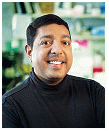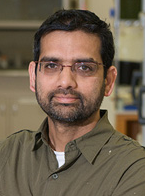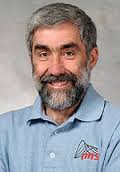Keynote Speakers
|
|
 Lawrence Hunter, Ph.D. (U.S.A.)
Lawrence Hunter, Ph.D. (U.S.A.)
ISCB founder. Professor and Director, Center for Computational Pharmacology and Computational Bioscience Program, University of Colorado
Title: Translational Analytics: Semantic Computing at Genomic Scale
Abstract
Cheap sequencing technology has transformed biomedical research, but translating the results of genome-scale assays into advances in medical care remains difficult. A key challenge is contextualizing genome-scale experimental results in light of all relevant prior knowledge. However, knowledge of biomedicine is very large, heterogeneous in character, and often accessible only in the texts of journal articles. To overcome these challenges, computational tools need to be designed to address several mutually constraining requirements: representing and reasoning about the knowledge relevant to an experimental result (data analytics), building the relevant knowledge-base from databases and the literature (text analytics), and presenting the right amount of information in the right way and at the right time to many different kinds of users (visual analytics). These analytics depend on semantic computing approaches, which do not necessarily map well onto existing supercomputing architectures. Furthermore, unlike for physicians, characterization of the information gathering needs of translational researchers remains poor. I will present some illustrative examples of translational analytics in action, and speculate about potentially productive approaches to addressing these challenges.
|
|
|
 Atul Butte, M.D., Ph.D. (U.S.A.)
Atul Butte, M.D., Ph.D. (U.S.A.)
Stanford Center for Biomedical Informatics Research, Stanford School of Medicine
Title: Translating a trillion points of data into therapies, diagnostics, and new insights into disease
Abstract
There is an urgent need to translate genome-era discoveries into clinical utility, but the difficulties in making bench-to-bedside translations have been well described. The nascent field of translational bioinformatics may help. Dr. Butte's lab at Stanford builds and applies tools that convert more than a trillion points of molecular, clinical, and epidemiological data -- measured by researchers and clinicians over the past decade -- into diagnostics, therapeutics, and new insights into disease. Dr. Butte, a bioinformatician and pediatric endocrinologist, will highlight his lab's work on using publicly-available molecular measurements to find new uses for drugs including drug repositioning for inflammatory bowel disease, discovering new treatable inflammatory mechanisms of disease in type 2 diabetes, and the evaluation of patients presenting with whole genomes sequenced.
|
|
|
 Charles Lee, Ph.D. (U.S.A.)
Charles Lee, Ph.D. (U.S.A.)
Director, Molecular Genetic Research Unit, Department of Pathology, Brigham and Women's Hospital, Harvard Medical School
Title: The function and evolution of structural genetic variants in human phenotypic variability.
|
|
|
 Anthony Brookes, Ph.D. (United Kingdom)
Anthony Brookes, Ph.D. (United Kingdom)
Professor, Bioinformatics and Genomics, Department of Genetics, University of Leicester
Title: Sharing and Connecting Knowledge, Rather Than Data
Abstract
Data alone (i.e., without full context and consent) are virtually 'useless', and carry many risks and complications - and yet extensive discussion and many efforts are underway to try to promote ubiquitous data sharing. Truly fundamental problems with widespread data sharing are perhaps being under-estimated. For example, by their very nature many sorts of omics data cannot be anonymised, and so directly allow the identification of research subjects who were promised privacy. Data also have strategic value in terms of collaborative discussions and career progression.
Perhaps this focus on data sharing is missing the point - in that the 'knowledge' revealed by the data is the truly 'useful' commodity, as it alone allows one to make predictions from observations. Critically, as well as being more 'useful', knowledge is also far simpler to deal with in terms of ownership, sharing and exploitation.
So we need to think beyond the 'data sharing' roadblock, and embrace new ideas such as data 'discovery', remote data analysis, data integration portals, automated authorisation, and database-journals. In short, we must focus on converting the data sharing challenge to a knowledge use imperative. Details and examples will be given.
|
|
|
 Yves A. Lussier, M.D. (U.S.A.)
Yves A. Lussier, M.D. (U.S.A.)
Professor and Director, DOM Center for Biomedical Informatics (CBI) of the Institute for Translational Medicine, University of Illinois at Chicago Collage of Medicine
Title: Personalome: clinically actionable 'Omics
Abstract
This presentation will highlight how multiple scales and analytes of deregulated 'omics measures can be interpreted on a single patient basis, combined and prioritized for predicting clinical outcome. While identification of deregulated polymorphisms are readily assessed on personal DNA-sequencing data, such signal derived over personal transcriptomes remains an unmet challenge. Further the mechanistic interpretation of non-coding polymorphisms and of transcriptomes to yield deregulated personal is also mostly unexplored. We will review leading edge approaches solving these issues using ENCODE data as well as strategies to derive interpretable and clinically actionable personal mechanism profiles. While the post-genome era lasted a decade, the post-ENCODE period is poised to rapidly be trumped by the advent of the "personalome" powering precision therapy.
|
|
|
 Bairong Shen, Ph.D. (China)
Bairong Shen, Ph.D. (China)
Professor and Director, Center for Systems Biology, Department of Bioinformatics, Medical College of Soochow University
Title: Translational bioinformatics for identification of prostate cancer biomarkers
Abstract
With the accumulation of high throughput biological data, especially the next generation sequencing data, it becomes possible to integrate these biological data with medical data to identify important molecular features for the early diagnosis, prognosis and treatment of complex diseases. But for the integration and modeling, we may face many challenges, such as 1) the modeling and simulation of the heterogeneous data at a systems network level; 2) the collection of paired biological and personalized medical data to reconstruct personalized models for the precise diagnosis, prognosis and treatment of complex diseases.
To take the advantage of these biomedical data and overcome these challenges as well as promote the application of informatics to translational research, we take prostate cancer as a case study and applied novel bioinformatics methods to the integration and analysis of prostate cancer associated data which include gene expression profiling, micro-mRNA interaction and protein-protein interaction, to identify the putative prostate cancer biomarkers for diagnosis and prognosis, the identified biomarkers were further validated by experimental or computational analysis. We concluded with our findings and the future perspectives on translational prostate cancer research.
|
|
|
 Sridhar Hannenhalli, Ph.D. (U.S.A.)
Sridhar Hannenhalli, Ph.D. (U.S.A.)
Associate Professor, Cell Bio & Mol Genetics Interim director, Center for Bioinformatics and Computational Biology, University of Maryland
Title: Distal enhancers and their role in mediating genotype-phenotype associations
Abstract
The ENCODE project, via generation of unprecedented transcriptomic and epigenomic profiles, has revealed a complex layer of transcriptional regulation mediated by distal regulatory enhancers distributed throughout the human genome. These data open up more questions than they answer. I will talk about our attempts to identify distal enhancers based on epigenomic marks, and then present our ongoing efforts to predict the gene targets of the distal enhancers. The broader context and the motivation for these studies are to interpret eQTL and GWAS results in light of enhancer-mediated regulatory networks. I will then present a first look at correlated networks of enhancers in the human genome.
|
|
|
 Terry Speed, Ph.D. (U.S.A.)
Terry Speed, Ph.D. (U.S.A.)
Active Emeritus Professor in the Department of Statistics at UC Berkeley.
Head of the Bioinformatics Division of the Walter &Eliza Hall Institute of Medical Research in Melbourne, Australia,
Title: Co-methylation
Abstract
CpG methylation is a mitotically heritable epigenetic mark on
DNA which plays a key role in genomic imprinting, X-inactivation,
transcriptional regulation, tissue specificity and carcinogenesis.
What is co-methylation? Loosely, it is the persistence of the
methylated (M) or unmethylated (U) state along a chromosome. Slightly
more precisely, it is the association between the methylation state at
nearby CpGs, as a function of their separation. "Co-" here is meant
to bring to mind correlation. This talk will summarize some results
concerning co-methylation we obtained by analysing publicly available
sequence data on whole genome bisuplhite-treated DNA. Our immediate
goal was to see whether we can simulate whole-genome methylation data
that is indistinguishable from the real thing. I'll explain why we want
to do this. It turns out to be quite hard (for us).
|
|
|
|